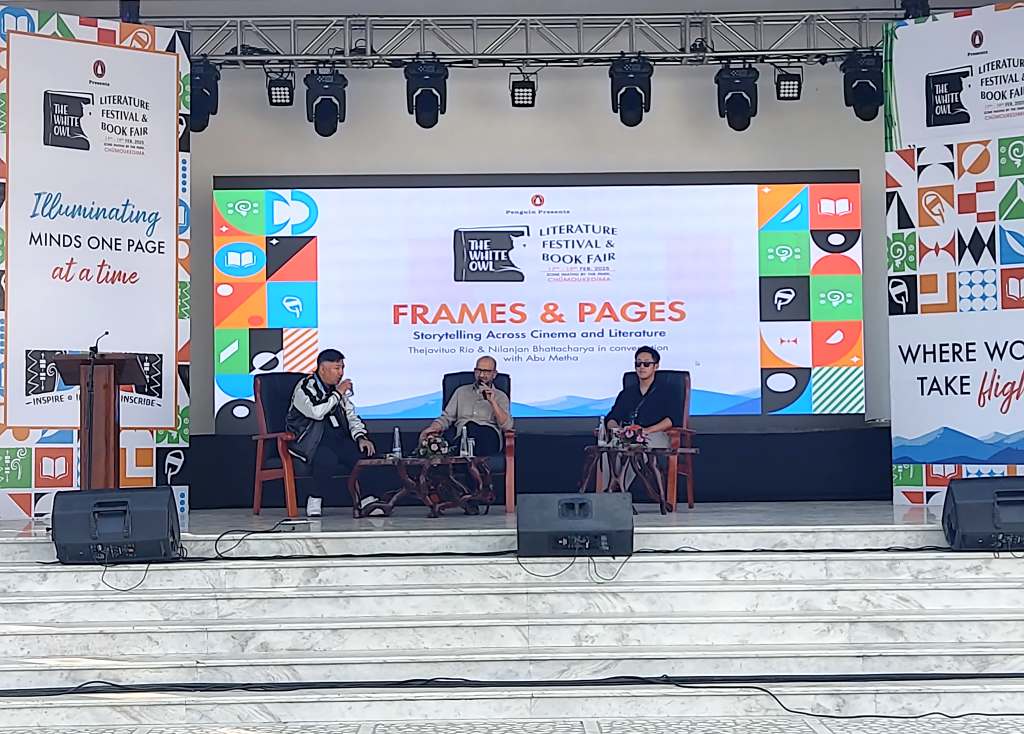THURSDAY, AUGUST 14, 2025
- Home
- Art of storytelling: Cinema and literature unite at White Owl Festival
Art of storytelling: Cinema and literature unite at White Owl Festival
‘Frames & Pages: Storytelling across cinema and literature’ on the final day of the 2nd edition of ‘Literature Festival & Book Fair,’ organised by The White Owl in partnership with Penguin, at Zone Niathu by the Park in Chümoukedima
Published on Feb 19, 2025
Share

Abu Metha in conversation with Nilanjan Bhattacharya and Thejavituo Rio at the 2nd edition of the “Literature Festival & Book Fair” held at Zone Niathu by the Park in Chümoukedima on Wednesday.
- DIMAPUR — “I know it very well from my heart that I don't know anything about the Northeast. I spent nine years making a film in Sikkim, but after doing that, I've realised that I know very little because there's so much variety and so many nuances—there are so many different communities that you know so little of. I imagine I would love to do something in Nagaland. It's a very different vibe here,” said documentary filmmaker, artist, and writer Nilanjan Bhattacharya.
- He was participating in a discussion with Advisor to the Chief Minister Abu Metha on ‘Frames & Pages: Storytelling across cinema and literature’ on the final day of the 2nd edition of ‘Literature Festival & Book Fair,’ organised by The White Owl in partnership with Penguin, at Zone Niathu by the Park in Chümoukedima.
Related story: Bureaucracy, borders discussed at White Owl Literature Festival
- Bhattacharya, while acknowledging that he does not have any institutional training in filmmaking, had to work hands-on.
- “I worked in the Bengal film industry, and then I made a little bit of television work, fiction, and then some short films, but somehow it was not working for me. I didn't like the whole television thing. So I started moving towards documentaries because I was fascinated, and it's mainly the indigenous people.
- “I started travelling and then doing research, and I found these people's knowledge, stories, and everyday life fascinating, and that really dragged me into making documentaries,” the filmmaker shared.
- Responding to Mehta’s query on the impact of his work on telling stories about food and indigenous culture and how this can benefit societies in a sustainable manner, Bhattacharya said that he writes about urban food because he is “a very urban person.” But while talking about indigenous food, he said that indigenous food can't really be separated as food because every part of life is connected: “forest is connected, nature is connected, culture is connected, and your everyday is connected.”
- “The traditional food is actually related to the natural surroundings, the belief system, and the traditions that have been flowing for thousands of years,” he expressed.
- Filmmaker Thejavituo Rio, whose short film ‘Angh’ won an award at Clermont-Ferrand and was screened at Palm Springs, said that he has made a bunch of short films that have had good film festival runs.
- Candidly admitting to thinking “that anyone would be interested in having to hear what I have to say is a bit baffling,” he said, ‘literature fundamentally, is storytelling, and storytelling has long been the most powerful tool in preserving history, shaping cultures, and exploring the human condition.’
- “Once I started writing scripts, I became possessive with what I was writing down, and I didn't want someone else to translate my vision to the screen, and that's how I stumbled my way into directing,” he shared on his journey as a filmmaker.
- On Mehta’s views concerning the ‘raw and brute’ elements of his films, Thejavituo responded that coming from the culture that Nagas have and “considering all the swift transitions that our people had to make, there are several themes that are inherent—traditionalism versus modernism, the old versus the new.”
- “Whenever I write, I think it's hard to sort of dissociate myself from the world that I come from,” he emphasised.
- On facing technical issues while shooting or making films in Nagaland, he pointed out that “getting a lot of technical people here is the biggest problem that we normally face. We don't have enough lights or enough good cameras. So I think we're feeling our way into the film industry.”
- Also, he shared that with Paatal Lok season 2 and Family Man 3 being shot in Nagaland, it's important that “we grab the opportunity by the neck and make full use of the exposure.”
- “We can have the equipment; we can have all of that, but it’s extremely important to have people who know how to use these machines. And the progress needs to go hand in hand—equipment and having the knowledge to do so,” he asserted.
- Mehta, while admitting that the Naga film industry is still very young, announced that they are working on a policy on how to engage the government more, get film producers to come, and provide support in terms of infrastructure.
- “These policies are being worked out, and later this month, on February 27 and 28, we're going to have a film festival organised by the state government in Kohima in collaboration with the Ministry of Information Broadcasting,” he informed.

